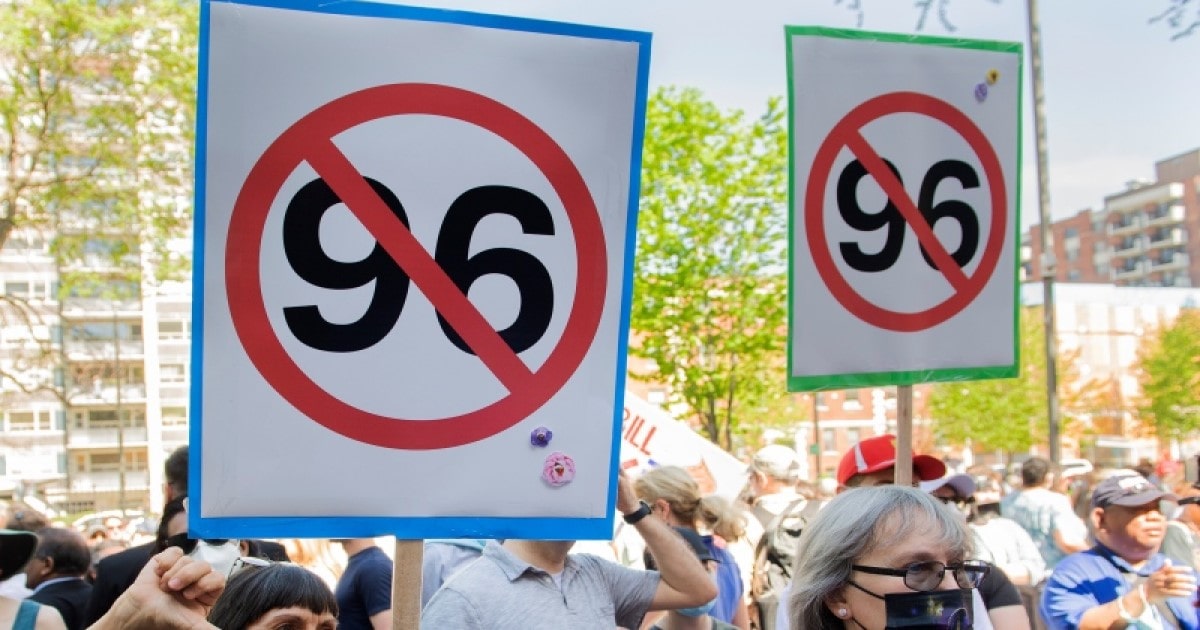Quebec’s Assault On Anglophones And Immigrant Languages Continues, With The Passing Of Bill 96
- Jiu Hui
- Eastern Canada
- Trending
- May 25, 2022

Another of Quebec Premier François Legault’s Controversial bills pass making Quebec the most authoritarian province in the Dominion
By: Charlotte Hui
Quebec’s majority government voted in the National Assembly yesterday afternoon to approve a controversial language bill that overhauls the French Charter and strengthens the use of French in Quebec by changing the rules for businesses, CEGEP students, new immigrants, and others.
In yesterday’s vote, 78 MPS voted in favor, 29 voted against, and the bill passed by mid-afternoon.
“One thing is for sure: if we want to improve the level of French here in Quebec, we need to act first on the state,” Simon Jolin-Barrette, the minister responsible for French, said,” If we want citizens to use more French, the one who is supposed to give that example is the state of Quebec.”
In education, the act limits the number of students attending English-language universities. The number of CEGEP students cannot exceed 17.5% of the total student population in Quebec, and all students must attend at least three 45-hour French classes.
French can be used as a second language for English-qualified people, and they can only take classes in speaking and writing French.
For those who do not qualify in English, their three core subjects must be in French, and they must take a French test at the end of their studies, and those who fail cannot receive a diploma.
In health care, to increase the use of French, government institutions must use it in an exemplary manner. But if there is a particular emergency, government agencies can use other languages.
Jolin-Barrette said, “Everybody who wants to receive health services in English, can receive it.”
“If you are an English-speaking Quebecer, or a recent immigrant, or a tourist, you can receive it in English. It was like that before. It’s like that now. And it will be like that in the future, after Bill 96.”
Meanwhile, in the judiciary, Quebeckers have the right to seek justice in English or French courts, but being able to speak English is no longer a requirement for becoming a judge.
In the workplace, businesses with more than 25 employees must develop a plan to ensure French becomes the official spoken language of the workplace, including obtaining a certificate from the government that it is the lingua franca.
Inspectors will have the authority to investigate any business suspected of violating the law. However, this section conflicts with the Charter’s protection of Canadians against unreasonable searches and seizures.
On the immigration front, new refugees and migrants to Quebec must have access to English and other language services within six months of arrival. After six months, all government services will be provided entirely in French, even if government workers can speak the same language as new immigrants.
Christopher Skeete, the assistant to the governor’s council, said, “What we’re saying is you actually have the right here, in Quebec, for six months to express yourself in another language.”
In recent weeks, thousands of people have protested against the bill, denouncing it as an impediment to the rights of Quebec’s anglophones, allophones, and Indigenous communities.
Dominique Anglade, leader of Quebec’s Liberal Party, said the bill was divisive and that it was “unrealistic, unacceptable and counter-productive” for new immigrants to learn French in six months. She worries that there are gray areas in health care in the bill that could lead to more communication problems.
Marlene Jennings, president of the Quebec Community Groups Network(QCGN), said, “Bill 96 is the most significant derogation of human rights in the history of Quebec and Canada.”
“This legislation revokes the right to access services in English for some 300,000 to 500,000 English-speaking Quebecers.”
On Tuesday, Prime Minister Justin Trudeau also said that he had concerns about the bill, “We’ll make our decisions based on what we see is the need to keep minorities protected across this country.”








